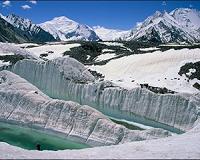| . |  |
. |
Cancun, Mexico (AFP) Dec 9, 2010 With billions of dollars in climate aid for poor nations set to go into operation, officials and businesses are looking at a role for private markets, but critics are deeply suspicious. Wealthy economies promised to help provide 30 billion dollars in rapid assistance -- for measures such as cleaner technologies and incentives to protect forests -- as well as 100 billion dollars a year in the future, at last year's Copenhagen summit. Pledges have since increased, including by millions of dollars during the latest major talks here, but overall targets remain distant, with some countries just restating pledges because of tough economic times. "It's absolutely clear that this (the current targets) cannot be delivered by public funding but that it requires private capital," said German Environment Minister Norbert Roettgen at a side event in Cancun this week. "Approximately 85 percent of investment flows in climate projects so far have been private," Danish climate minister Lykke Friis pointed out. How private investment would flow into the green fund is a contentious issue, with many NGOs and poorer countries concerned they would be sidelined. Financiers have pointed to a potential role for investment funds, venture capital or international banks. Companies around the world will need to undergo an enormous shift in the way they operate, Imtiaz Ahmad, executive director of carbon finance at Morgan Stanley, said at a Cancun side meeting. "This is not business as usual. If it was we'd still be building coal-fired factories," Ahmad said. He pointed to bond markets as a possible solution to absorb the 100 billion dollars per year pledged by 2020 at Copenhagen. "It's very important that we don't as a private sector have the multilateral development banks dictating to us," he added. "That isn't going to work. We're going to be looking at rewards." Local operators of environmental projects have meanwhile expressed fears that they will miss out on new investment opportunities, as they did during decades of industrial development. Simon Thuo, East African coordinator for the Global Water Partnership, said small African businesses feared that slick operations by international companies or powerful local monopolies would win potential funds. "The regulatory measures need to be improved so it is a level playing field for all actors," Thuo said. "At the end of the day, the most important thing is to enhance resilience of societies, especially the poor, not just to meet targets." Leftist activists and Mexican peasants took to the streets of Cancun during the conference in part to protest against a market role in forest preservation, which they said would allow rich nations to keep polluting. Negotiators have expressed optimism about setting up the architecture of a future climate fund, but a remaining sticking point is whether to include a role for international bodies, such as the World Bank, in administering aid. Guidelines still need to be set for reporting financial information efficiently and transparently, and a dispute remains on whether wealthy nations would be required to provide half of the aid to help the poor adapt. Then there is the question of how wealthy nations would raise the money, with some advocating levies on airplane or shipping fuel. The Dutch government set up a website, www.faststartfinance.org, in September to improve transparency with publicly available information on the first rapid finance pledges. "We have to know where the money comes from, how it is spent and of course probably the most important, what the results are," Dutch Environment Minister Joop Atsma said at a side event in Cancun. Those participating in the website, including the European Union, the United States and Japan, have so far pledged more than 24 billion dollars and committed almost five billion in 2010. Many hope that concrete financial pledges and successful projects will help maintain momentum in climate talks, despite difficult negotiations. "It is important to see that, beside this negotiation track, that there is action," Roettgen said.
Share This Article With Planet Earth
Related Links Climate Science News - Modeling, Mitigation Adaptation
 Himalayan Glaciers Melting At Alarming Rates
Himalayan Glaciers Melting At Alarming RatesCancun, Mexico (SPX) Dec 09, 2010 Concern for high-mountain regions of the world is rising, according to a new report released by the United Nations Environment Programme (UNEP), which states that the Himalayas and many other glaciers are melting quickly, threatening lives by flooding, and by reducing the region's freshwater supply. The findings of the report, "High mountain glaciers and climate change" were announced duri ... read more |
|
| The content herein, unless otherwise known to be public domain, are Copyright 1995-2010 - SpaceDaily. AFP and UPI Wire Stories are copyright Agence France-Presse and United Press International. ESA Portal Reports are copyright European Space Agency. All NASA sourced material is public domain. Additional copyrights may apply in whole or part to other bona fide parties. Advertising does not imply endorsement,agreement or approval of any opinions, statements or information provided by SpaceDaily on any Web page published or hosted by SpaceDaily. Privacy Statement |